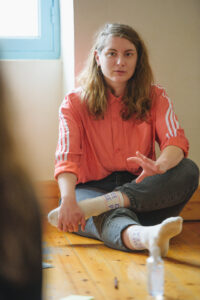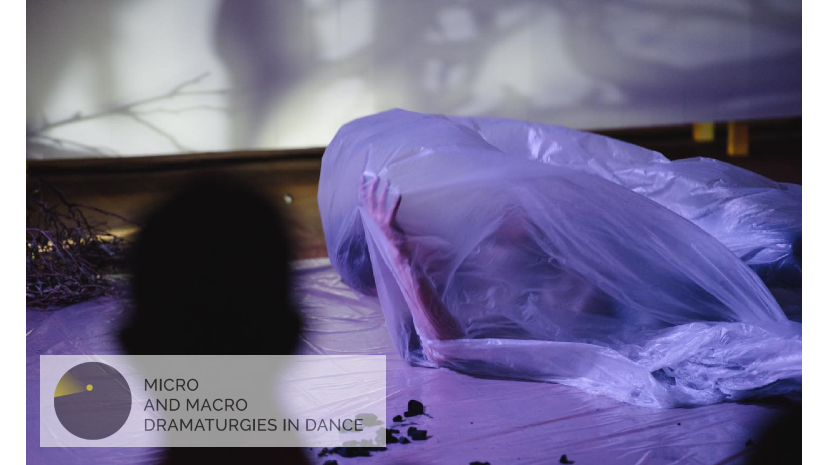Micro and Macro Dramaturgies in Dance / Dance House Lemesos’ Creative Pair
Micro and Macro Dramaturgies in Dance is a two-year-long European research and training project, that brings together six leading contemporary dance organisations: Anghiari Dance Hub and Marche Teatro (Italy), Bora Bora (Denmark), Dance House Lemesos (Cyprus), DansBrabant (the Netherlands) and Tanec Praha (Czechia) to explore through exchange and collaboration dramaturgy as a creative and socially conscious practice. The project is coordinated by Tanec Praha and curated by a Scientific Team of dramaturgs: Guy Cools, Katalin Trencsényi, Maja Hriešik, and Anne-Marije van den Bersselaar.
The project provides an opportunity to give artists from five partner countries (the Czech Republic, Italy, the Netherlands, Denmark and Cyprus) the experience of leading European dance dramaturges led by Guy Cools, each year through two 10-day workshops (in the spring and autumn) for selected pairs of artists from each country (a choreographer and their potential dramaturge), but always open to the wider professional public. Each workshop will include a seminar with the participation of the wider art community and the last workshop in Prague will conclude with a final presentation of the outputs of the whole two-year project open to the general public.
Meet Dance House Lemesos’ Creative Pair


Konstantina Skalionta (choreographer)
Konstantina Skalionta is a dance artist and performance maker based in Limassol, Cyprus. Her inspiration draws personal experiences of family, home, body image and the sense of belonging, transforming them into something universal. Her choreographic research focuses on exploring different narratives that emerge from the interaction between the human body and physical materials. Performances such as #NoFilterNeeded (2019), Be My Home (2016), In the Likeness of.. (2015), Beauty-fool (2014), use movement and the manipulation of props, objects and other kind of materials, which sometimes are developed through collaborations with other artists.
Her work has been presented at the NiMAC (Seeking Roots exhibition), The Open House Festival 2020, the 17th Summer Dance Festival by Nea Kinisi (Cyprus), the UKYA Nottingham Take Over 2019 (Dance4), Resolution 2014-16 (The Place Theatre), Swallowsfeet Festival 2015 (Market Theatre), Fiver Fridays (Chisenhale Dance Space), No_Body 2015, 2019 & 2020 (Dance House Lefkosia), the 19th & 15th Cyprus Choreographic Platform (Rialto Theatre), Women of Mass Destruction 2 (RichMix) etc.
Konstantina was resident artist at the Dance House Lemesos (Moving the New 2020) with mentor Rodia Vomvolou, the international centre of choreography Dance 4 (Nottingham), the NN Contemporary Gallery (Northampton), The Lyric Hammersmith (Development Lab2) and the Egomio Cultural Centre. She is an alumna of London Contemporary Dance School (MA in Contemporary Dance, 2018) and the Central school of Ballet (BA Hons in Professional Dance and Performance, Choreography Award 2011).
Rodia Vomvolou (dramaturg)
Rodia Vomvolou (1993, Greece) is a performing arts dramaturg and researcher based between Amsterdam and Athens. She is currently doing a PhD research project on the self-positioning of the dance dramaturg, under the supervision of Prof. Dr. Maaike Bleeker in the Department of Media and Performance Studies of Utrecht University. Rodia holds an MA in Contemporary Theatre, Dance and Dramaturgy (Cum laude) from Utrecht University, as well as a BA in Drama and Performance Theory, History and Analysis from the School of Drama, Aristotle University of Thessaloniki, Greece (Cum Laude). Supported by a scholarship from Stavros Niarchos Foundation, in 2016 she attended a five months exchange program in Theatre and Dance Studies in York University (Toronto, Canada). As a freelancer dramaturg and mentor, Rodia collaborates with institutions and dance houses in Europe (Dansmakers Αmsterdam, Dansateliers Rotterdam, Circustruction Rotterdam, Dance House Lemesos, Dance Days Chania, ZfinMalta) as well as with independent artists in Greece (Danae Theodoridou, Eleni Mylona, Persa Stamatopoulou, Ioanna Angelopoulou, Nefeli Asteriou, Anastasia Valsamaki etc.), the Netherlands (Fernando Belfiore) and Cyprus (Petros Konarris, Konstantina Skalionta). Since 2019 she is the mentor and curator of the Artistic Development programme “Moving the New” of Dance House Lemesos in Cyprus.
Once There Was A Forest immerses the viewer into a world that is gradually diminishing. Three performers on stage (two performers, one musician), create an ever-changing audiovisual landscape, using natural and man-made materials such as charcoal, stones, ice, tree brunches, plastic, fans.
They trace back the primal history between nature and man, bringing in front of your eyes the efforts of humankind to tame nature and the imposing forces of nature upon humans. By exposing the life that survived through the eternal battle between man and nature, the performers invite you to look at how fragile and temporary the world has become.
The performance refers to the Anthropocene, the proposed current geological epoch, in which humans are the primary cause of permanent planetary change, while tracing the uncertain present of the pandemic and the environmental degradation happening on our planet. It takes inspiration by the photographic work of David Maisel (Black Maps) and Edward Burtynsky (The Anthropocene Project) that captures landscapes from above that are phenomenologically beautiful, but in reality are destroyed by human activity and the book Art in the Anthropocene, a series of articles edited by Heather Davis and Etienne Turpin.
Konstantina’s choreographic approach is influenced by the New Materialism, a movement in several fields, that perceives materials as agential, and thus seeks to explore how objects initiate and choreograph behaviour rather than how performers engage with materials. The work investigates in ways materials can be used as extensions of the human body or as other bodies in the context of performance.
Once There Was A Forest is now developing as a 40-minute performance to premier in Cyprus at the end of November 2021 funded by the Ministry of Culture. Continuing the collaboration developed during the residency, Rodia was asked to be the dramaturg of the piece as there is an existing knowledge of the process, the way of working and the previous stages of the work, as well as an established connection.


